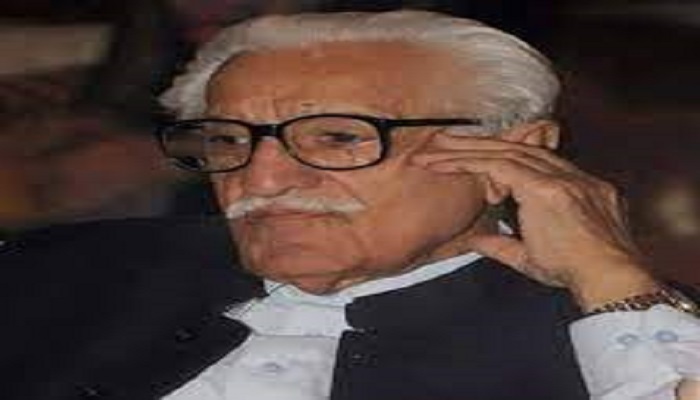Former Caretaker Prime Minister, Senior Politician and Chief Mazari tribe, Sardar Mir Balkh Sher Khan Mazari passed away after a long illness on Friday
Mir Balkh Sher Mazari was the grandfather of Mir Dost Mazari, the former Deputy Speaker of the Punjab Assembly. Funeral prayers will be offered in Rojhan.
Born in 1928 in Rojhan, Dera Ghazi Khan, Mir Balkh Sher assumed the de jure chieftainship of the Mazaris in 1933, upon the untimely death of his father, Mir Murad Khan Mazari. Since 1948, he had also exercised de facto control over the tribe, a remarkable feat of 74 years’ duration!
[embedpost slug=”dost-mazari-sent-to-jail-on-judicial-remand-in-land-encroachment-case/”]
The Mazari chieftain’s long political career began in the early 1950s, with his election as the Finance Secretary of the Punjab Muslim League and as the Chairman of the Dera Ghazi Khan District Board. Over the next four decades, apart from his election to the Constituent Assembly in 1955, he has been elected an MNA on five occasions (1962, 1977, 1985, 1990 and 1993) and an MPA once (1970). Never had Mir Balkh Sher been defeated in any electoral contest: an achievement enjoyed by few, if any, major politicians in Pakistan’s history. He was the last survivor of the second Constituent Assembly (1955-1958).
All these distinctions belonged to none other than the Tumandar (paramount chief) of the Baloch Mazari tribe, the veteran politician and former caretaker prime minister, Mir Balkh Sher Mazari.
Some aspects of Mir Balkh Sher’s political innings are of particular interest. To begin with, he became the first person in Pakistan’s history to assume prime ministerial office without previously having held any ministerial/executive position or having served as the leader of a political party. Benazir Bhutto, too, had become prime minister in 1988 without previous governmental experience, but at least she had been the co-chairperson and the driving force of the PPP for many years before her election to the premiership. Mir Balkh Sher had no such experience to his credit.
Secondly, Mir Balkh Sher has the dubious distinction of serving as prime minister for the shortest period in Pakistan’s history. His planned 90-day tenure began on 18 April 1993, when he assumed the caretaker prime-ministership upon the dismissal of Mian Nawaz Sharif’s government by president Ghulam Ishaq Khan. However, his premiership abruptly ended after a mere 37 days, when the Supreme Court restored Nawaz Sharif to office on 26 May 1993.
It is worth mentioning that on 6 December 1971 the veteran Bengali leader Nur-ul-Amin was designated as prime minister by General Yahya Khan for the dying 14 days of his dictatorship. But since this was not a constitutional nomination, rather it was an irregular appointment under Martial Law, therefore Nur ul Amin’s brief “period in office” does not really count.
Another less than flattering distinction of Mir Balkh Sher’s career has been its lack of political constancy. In 1964, he supported Fatima Jinnah in her electoral contest with Ayub Khan, but after the latter emerged victorious, Mir Balkh Sher duly joined the king’s party, the Convention Muslim League, only to desert its ranks once Ayub Khan departed from the scene in 1969. Similarly, in 1970 he was elected an MPA as an independent candidate, one of the few politicians to withstand the PPP wave in the Punjab, but in 1974 he joined the PPP. Later, with remarkable prescience he saw the writing on the wall and he left the PPP a few months before the coup of 5 July.



















